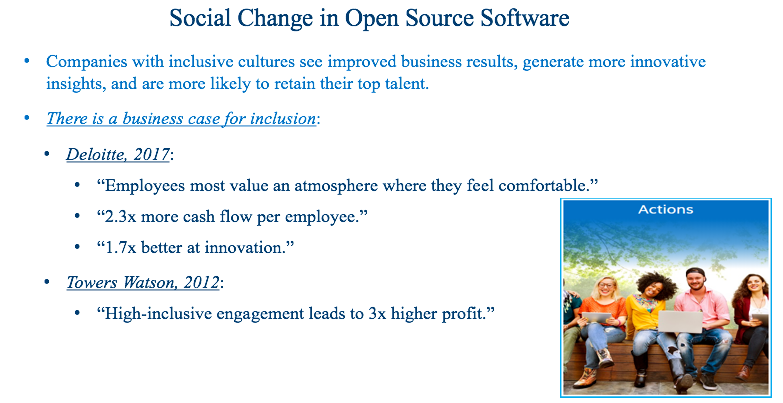Amy Occhialino is the Chair of the Zephyr Project Governing Board and Director of Software Engineering at Intel. She has more than 20 years experience in technology and has recently shared insight into the social change in open source software at several conferences. She recently gave the keynote at The Consortium for Computing Sciences in Colleges and the Society of Women Engineers. In this blog, Amy shares some of that insight from her talks.
You may know Intel only as a hardware company, and in many ways this is true. Intel’s core business is semiconductor design and manufacturing. What may be news to you is that Intel has spent close to two decades working in the open source software community, collaborating on projects that enhance Intel Architecture and advocating for the beauty, elegance, and possibilities that exist within open source software development.
Intel software engineers are key contributors to the Linux kernel, are Linux kernel maintainers, and hold many software standards and leadership positions within open source projects and communities. Open source software development is an enormous commitment and investment at Intel. In fact, we went from sponsoring 12 open source projects to 200 spanning cloud, edge, and device growth over the last decade. The Zephyr Project is a great example of this.

Leading the future will require a wide range of perspectives, backgrounds, and ideas to effectively solve the world’s toughest challenges. We, as a technology community, are bound to fail if we do not demonstrate a commitment and passion to increasing and achieving full representative diversity within the open source software industry.
Our success will be threatened in three ways:
- Market Failure: Without diversity-fueled creativity, innovation is stifled. The same perspective and thoughts are generated and reinforced, preventing new solutions from emerging.
- Customer Failure: We will lose customers because we don’t listen to them, engage with them, understand them, and learn from them in a full perspective of ways.
- Talent Failure: We will lose top talent because individuals with diverse backgrounds feel out of place in our culture and environment.

The Zephyr Project is committed to achieving an inclusive and diverse open source environment. We encourage any and all developers interested in the RTOS landscape to join the conversation and share your interests and talents with the community. Change doesn’t happen all at once, it’s incremental, one person doing one thing every day.
For me, I personally increase diversity in my own teams through my hiring practices, I have spent a decade creating support systems through my leadership of women’s groups, and I actively advocate for social change within Intel and my tech community. I am proud that Zephyr is part of this as an open source project with a high amount of diversity
Open source software gives us the potential conditions, but we must actively engage with it, and monitor it, for it to be what we want it to be.
If you’re new to Zephyr RTOS, please see our Getting Started Guide and check out our Contributor Guide. Or, you can join the conversation and ask questions on our Slack channel or Mailing List and follow #zephyrproject on IRC.